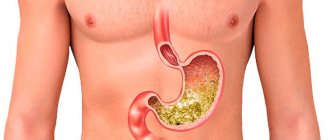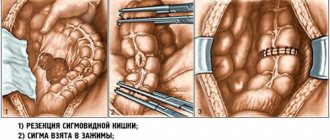An unpleasant odor emanating from the oral cavity causes psychological discomfort, reduces self-esteem, and can signal various pathologies in the body, systemic diseases, and physiological disruptions in the functioning of internal organs.
The reason does not always lie in insufficient hygiene or dental diseases. The smell of ammonia from the mouth in adults may indicate problems in the functioning of the digestive tract, impaired functioning of the kidneys, liver, as well as the presence of other health problems in a person.
Bad breath: physiology or disease?
Bad breath
in medical language it is called
halitosis
. There are physiological and pathological halitosis. Bad breath often appears in the morning. During the night, bacteria and their metabolic products accumulate in the mouth, which causes a bad odor. This type of halitosis is physiological and can be eliminated by simply brushing your teeth. Physiological halitosis also includes odor caused by eating a number of foods, such as garlic, onions, cabbage. This smell will disappear on its own as soon as the substances that caused it are eliminated from the body. But it also happens that an unpleasant odor is not eliminated using hygiene procedures; in this case, most likely, it is of a pathological nature.
How to alleviate a child’s condition with acetone?
Elena Karzhinerova, a medical pediatrician, will talk about this:
“With elevated acetone, it is important to first eliminate the causative factor. And since the condition is caused by a lack of glucose, the best medicine is sweets, fruits and other foods that can quickly replenish glucose reserves and restore metabolic processes. As for relieving intoxication, drinking sweetened teas, compote, and fruit juices will help with this task. In the acute phase of ketoacidosis, Coca-Cola will help quickly increase glucose levels due to the high sugar content in the drink. Of course, this does not apply to children with diabetes: in their case, individual recommendations from a doctor are needed.”
Bad breath: causes
The most common cause of unpleasant odor is the active activity of pathological bacteria in the oral cavity. Diseases such as caries, periodontitis, pulpitis, periodontitis, gingivitis, stomatitis, as well as the formation of tartar can lead to persistent bad breath.
The second place among the causes of unpleasant odor is dry mouth (the medical term is xerostomia
). Mica, which moisturizes our mouth, has bactericidal properties. It kills bacteria, neutralizes their waste products, rinses and cleanses the oral cavity. If there is not enough saliva produced, bacteria are activated, resulting in an odor. Dry mouth can be a consequence of illness or taking a number of medications. It can also be caused by age: over time, the salivary glands begin to work less intensively, the composition of saliva changes, and its antibacterial properties are lost.
The smell can also be caused by ENT diseases: sore throat, chronic tonsillitis, sinusitis, runny nose.
Another cause of unpleasant odor is diseases of the internal organs. It can be:
- renal failure;
- liver failure;
- gastric diseases (gastritis, stomach ulcer);
- lung diseases.
Smoking is also a cause of persistent bad breath. The smell is caused by substances contained in tobacco smoke and deposited in the oral cavity. The only way to eliminate the unpleasant odor in this case is to quit smoking.
Symptoms, diagnosis
Excess ammonia in the body can lead to a deterioration in general condition, malfunction of internal organs, slowdown of metabolism and metabolic processes at the cellular level. A person feels a sour-sweet taste, severe weakness, fatigue, irritability, and a deteriorating emotional state. Severe headaches, fever, sudden mood swings are possible.
A strong uremic odor from the mouth can occur in adults at any age. Only by establishing the root cause can you select adequate treatment and effective techniques that will restore fresh breath. It is necessary to undergo a comprehensive diagnostic examination at a medical center.
Important! Therapeutic methods and pharmacological agents should be prescribed by a doctor based on the diagnostic results. Self-medication can only aggravate the situation and lead to the development of serious complications and health problems.
It is necessary to undergo examination by a gastroenterologist, therapist, endocrinologist, or dentist. It is imperative to do an ultrasound of the internal organs, a general and biochemical blood test.
What is bad breath like?
Peculiarities of odor can indirectly indicate the source of problems.
Hydrogen sulfide smell
(the smell of rotten eggs) indicates rotting protein substances. This smell is typical for digestive problems. A persistent hydrogen sulfide odor may indicate gastritis with low acidity or a stomach ulcer.
Sourish smell
and a corresponding taste in the mouth is noted with gastritis with high acidity. This smell may appear at an early stage of the disease, when other symptoms are not yet present.
Bitter smell
and the taste in the mouth is typical of liver and gallbladder diseases. An additional symptom is the appearance of a yellow coating on the tongue.
Smell of acetone
and the accompanying sweet taste in the mouth is a characteristic symptom of diabetes.
Urine smell
from the mouth indicates a disease of the genitourinary system (primarily the kidneys or bladder).
Stool smell
from the mouth can occur due to intestinal diseases (dysbacteriosis, intestinal dyskinesia, intestinal obstruction).
Putrefactive
bad breath is typical for dental diseases (inflammatory processes of teeth and gums).
Treatment
Drug therapy, regimen, course, and duration of treatment are selected individually in each specific case. The choice of treatment methods depends on the root cause, age, and general physiological condition of the person.
Patients may be prescribed:
- enzyme agents;
- symptomatic medications;
- immunomodulators;
- hepatoprotectors;
- antibacterial, antiparasitic complex drugs;
- diuretics, hormones;
- anti-inflammatory drugs.
If bad breath is caused by acute or chronic pathologies or diseases, much attention is paid to symptomatic therapy and complex treatment.
Aerosols that suppress the development of pathogenic flora and special antiseptic solutions will help:
- Stopagin. A complex drug with a pronounced antiparasitic and antibacterial effect. Prescribed for rinsing.
- Chlorhexidine. Has an aseptic, bactericidal effect. Used to treat pathologies of the urinary system.
- Hexoral. An effective remedy for the treatment of dental diseases.
If endocrine disorders are diagnosed, treatment therapy is carried out under the supervision of the attending physician. Drugs are prescribed to suppress the activity of the thyroid gland, normalize its functioning, and secretory activity. For thyrotoxicosis, radioactive iodine is used.
For renal diseases, drug therapy depends on the form and stage of the underlying disease. Diuretics, anti-inflammatory, and antibacterial agents with complex effects may be prescribed, the action of which is aimed at relieving the clinical symptoms of the disease.
If uremic stench is provoked by strict diets, prolonged fasting, unbalanced nutrition, the attending physician or nutritionist will adjust the diet and prescribe a special diet to normalize metabolic processes and water and electrolyte balance in the body.
Bad breath: what to do?
The fight against bad breath begins with careful adherence to good oral hygiene. If the source of the odor is bacterial activity, proper brushing of your teeth will help. Teeth should be brushed not only from the outside, but also from the inside, and also treat the chewing surface of the teeth. The brush angle should be 45°. Using dental floss, hard-to-reach areas between teeth are treated. If your teeth are in poor condition, simply brushing your teeth will not solve the problem. You will need to visit a dentist and remove tartar, and if your teeth have caries, cure them. It is recommended to visit the dentist at least once or twice a year.
It is also necessary to combat dryness of the oral mucosa. If you feel dry mouth, take a few sips of water and rinse your mouth. However, it should be remembered that frequent dry mouth can be a symptom of serious diseases. However, like the unpleasant smell itself. Therefore, if you have persistent bad breath, you should definitely see a doctor and undergo an examination.
Diabetes
For example, Evgenia Parshina notes that with diabetes, a person can smell a fruity or apple aroma from himself. A similar manifestation is observed when following, for example, a keto diet. The smell of diabetes is quite characteristic, it is similar to the aroma of soaked, fermented apples and resembles acetone. In people suffering from diabetes, there is a sharp increase in blood glucose levels, and ketone bodies begin to be released. Under starvation conditions, cells begin to actively use fats and proteins, including those stored for future use by the body, and when they break down, acetone begins to appear.
Kidney problems
“Another chronic disease that can lead to the appearance of an unusual odor is kidney failure,” says Evgenia Parshina. Thus, with diseases of the urinary system, for example nephrosis, pyelonephritis, etc., manifestations of the smell of ammonia may be observed. Usually this kind of smell appears already in the terminal stage. The mechanism by which the odor appears is that the main source of ammonia is the catabolism of amino acids and the breakdown of other nitrogen-containing compounds in tissues, including the kidneys. An imbalance leads to the accumulation of a substance in the blood.
Salty taste. What diseases does this symptom indicate? More details
Metrogyl Denta® for inflammatory diseases of the oral cavity accompanied by halitosis
Since one of the causes of bad breath is inflammatory periodontal diseases2, one of the directions of therapy should be the treatment of inflammatory diseases of the oral cavity.
Dental gel Metrogyl Denta® is a drug that can be used for the treatment and prevention of most infectious and inflammatory diseases of the oral cavity, in particular gingivitis and periodontitis7. It contains two active antimicrobial components - the antibiotic metronidazole and the antiseptic chlorhexidine, which are effective against the main anaerobic bacteria that cause periodontal diseases7.
to come back to the beginning









